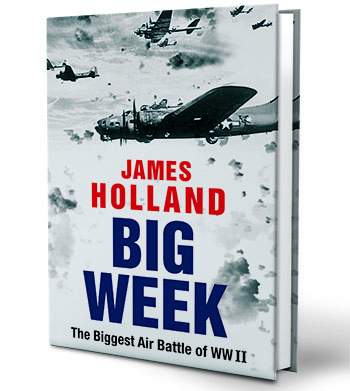
By James Holland.
432 pp. Atlantic Monthly Press, 2018. $28.
BRITISH AUTHOR JAMES HOLLAND excels at writing engaging, accessible books, while weaving the latest scholarship in with personal accounts gleaned from diaries, archives, and interviews. Here he turns his narrative talents to the struggle for air superiority over occupied Europe in 1943–1944, culminating with Operation Argument, the February 1944 assault on the German aircraft industry better known as “Big Week.”
This is far more than a simple battle study. Holland spends nearly two-thirds of the book setting the stage. He covers prewar thinking about air power, the slow buildup of the Combined Bomber Offensive, and the gradual realization that defeating the German air force was an absolute prerequisite for an invasion of the Continent, and for Allied victory. His treatment of the battle’s issues and controversies—the late 1943 command shakeup at the U.S. Eighth Air Force, the debate about U.S. Army Air Forces fighter escort tactics, and the development of technology—is judicious. And the author’s coverage of the Luftwaffe’s air defense effort is more accurate than that found in many accounts. The German defeat stemmed from many long- and short-term causes, not just Nazi bungling (though there was plenty of that).
At bottom though, Big Week is a story about people. Many of Holland’s protagonists are familiar—Hollywood star and B-24 squadron commander Jimmy Stewart, Luftwaffe ace Heinz Knoke, and P-47 legend Bob Johnson to name a few. Yet Holland almost always manages to say something new. His examination of Luftwaffe fighter commander Adolf Galland, for example, relies not only on the pilot’s memoirs but on Galland’s much more candid 1945 interrogation.
Holland also brings less celebrated figures to the fore. We encounter two inseparable brothers, both captains in British heavy bomber crews; only one would survive the war. He describes the slumping morale in the Army Air Forces’ bomb groups through the poignant memories of a chaplain, ministering to aircrew and removing burned bodies from a crash scene. Holland does not neglect the ordinary “crew dogs,” unaware of the controversies swirling at the higher headquarters. Vignettes from German civilians round out the story.
The last third of the book—Big Week itself—brings together all of the personalities and narrative threads. Holland emphasizes not only the Eighth Air Force aspects of the story, but the “Forgotten Fifteenth” Air Force based in Italy and RAF Bomber Command. The book offers no startling revisionist conclusions. Nor does it plow new ground in examining the morality of the air war or the bombing campaign’s impact on the Nazi war economy. Its major accomplishment is to firmly place Big Week and the events surrounding it within the larger historical narrative of the Allied campaign in Western Europe. It was, Holland argues, the turning point of not just the air battle, but the entire war. —Richard R. Muller is a professor of military history at the USAF School of Advanced Air and Space Studies, Maxwell AFB, Alabama.
This review was originally published in the February 2019 issue of World War II magazine. Subscribe here.





